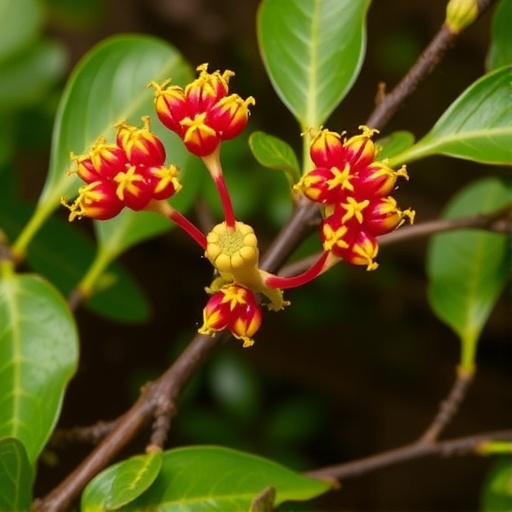In a groundbreaking study presented in the journal BMC Complementary Medicine and Therapies, researchers have uncovered the remarkable inhibitory effects of berberine—a bioactive compound derived from several plants—against the pernicious fungal pathogen Fonsecaea monophora. This organism is notorious for causing severe infections, particularly in immunocompromised patients, making the findings particularly pertinent given the increasing rates of fungal infections globally. Berberine’s efficacy was demonstrated through both in vitro and in vivo experiments, leading to optimism in its potential application in clinical settings.
Berberine, an isoquinoline alkaloid, has been recognized for its multiple pharmacological properties, including antimicrobial, anti-inflammatory, and antidiabetic effects. The current study shines a spotlight on berberine’s antifungal abilities, specifically its action against Fonsecaea monophora. The research highlights how berberine interferes with the growth and replication of this pathogen, which poses a significant threat in healthcare environments, where its prevalence has been linked to increased morbidity and mortality.
The study employed rigorous in vitro methodologies to elucidate berberine’s antifungal mechanisms. By subjecting Fonsecaea monophora cultures to various concentrations of berberine, researchers observed a significant reduction in fungal viability. The minimum inhibitory concentration (MIC) was meticulously determined, showcasing berberine’s potential as a viable alternative to conventional antifungal agents, which are often limited due to resistance issues. This aspect of the research is critical, as the rise of antifungal resistance remains a significant concern for healthcare systems worldwide.
Further investigation into the mechanisms underpinning berberine’s antifungal action unveiled that it disrupts cellular integrity and hampers crucial metabolic pathways within Fonsecaea monophora. Electron microscopy studies revealed structural anomalies in the fungal cell walls when exposed to berberine, indicating compromised cell wall integrity and potential disruption of cell membrane function. These findings provide a detailed understanding of how berberine acts at the cellular level, offering insights that may pave the way for new antifungal therapies.
In vivo experiments complemented the in vitro findings, affirming the efficacy of berberine in a living organism model. The researchers utilized animal models that were deliberately infected with Fonsecaea monophora to ascertain berberine’s therapeutic potential. Remarkably, administration of berberine resulted in significant survival benefits and reduced fungal loads, underscoring its promise as a therapeutic agent. This dual approach—combining in vitro and in vivo results—strengthens the validity of the findings and suggests a real potential for berberine in clinical applications.
The research team, under the leadership of L. He, along with co-authors Y. Zhu and X. Mei, advocates for the integration of berberine into treatment protocols, particularly given its relatively low toxicity profile and accessibility as a natural compound. The fact that berberine has already been widely used in traditional medicine for various ailments bolsters the argument for its integration into modern medical practices. Their call to action emphasizes the need for further clinical trials to fully establish berberine’s antifungal profile and confirm its safety and efficacy in human subjects.
The study does not merely end with highlighting the potential of berberine; it also alludes to the necessity for new laboratory-based approaches to tackle rising antifungal resistance. The rise of drug-resistant strains of fungi like Fonsecaea monophora underlines an urgent need for innovative strategies in antifungal therapy. Berberine offers a multifaceted approach that not only tackles existing infections but may also play a role in preliminary preventative measures against fungal colonization, especially in vulnerable populations.
This groundbreaking research also opens the floor for discussions about the broader implications of employing natural products in the fight against infectious diseases. The trend of exploring traditional herbal medicines for antimicrobial properties is gaining momentum, with various studies documenting the efficacy of other compounds similarly derived from plants. This research by He et al. adds to a growing body of evidence supporting the scientific investigation of herbal medicine principles and their utility in modern therapeutics.
Furthermore, these findings could also inspire researchers to delve deeper into the synergy between berberine and other antifungal agents, exploring potential combination therapies that may lead to more effective treatments. The researchers hint at the need for exploratory studies examining the co-administration of berberine with existing antifungal drugs to enhance therapeutic outcomes. This multifaceted approach may be crucial in devising strategies that mitigate resistance development.
In summary, the study conducted by L. He and his colleagues represents a significant advancement towards understanding and potentially mitigating the threat posed by Fonsecaea monophora. The documented inhibitory effects of berberine not only underscore its potential as an effective antifungal agent but also highlight the importance of exploring natural products as viable treatment options in an era where drug resistance is rampant. Their findings warrant further exploration and clinical validation, paving the way for new treatment paradigms in infectious disease management.
In light of the results from this study, it becomes increasingly clear that a thorough reevaluation of existing antifungal therapies is necessary. By incorporating naturally derived compounds like berberine into clinical practice, the healthcare community may find themselves better equipped to tackle the persistent and evolving challenges posed by fungal infections. This research sparks hope and optimism for new frontiers in the battle against infectious diseases, reminding us that nature often holds the key to solutions for modern medical dilemmas.
As we await further validation in clinical trials, the prudent message remains: exploring alternatives rooted in nature may very well lead us to innovative solutions in an increasingly complex medical landscape. The findings of this study serve as a stepping stone, urging researchers and clinicians alike to pursue the integration of natural compounds like berberine into contemporary medicine, bolstering our defenses against the ever-evolving threats of fungal pathogens.
Subject of Research: Inhibitory effects of berberine on Fonsecaea monophora
Article Title: Inhibitory effects of berberine on Fonsecaea monophora in vitro and in vivo
Article References:
He, L., Zhu, Y., Mei, X. et al. Inhibitory effects of berberine on Fonsecaea monophora in vitro and in vivo.
BMC Complement Med Ther 25, 387 (2025). https://doi.org/10.1186/s12906-025-05121-4
Image Credits: AI Generated
DOI: 10.1186/s12906-025-05121-4
Keywords: berberine, Fonsecaea monophora, antifungal, in vitro, in vivo, drug resistance, natural compounds




